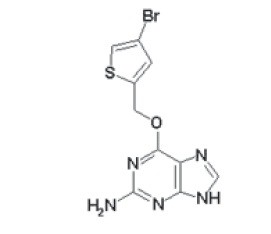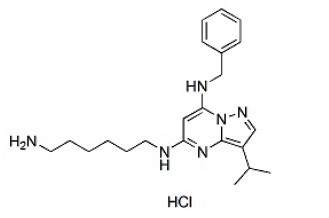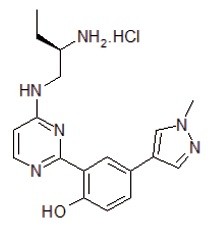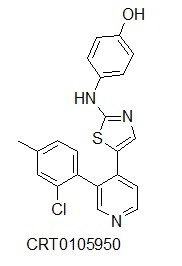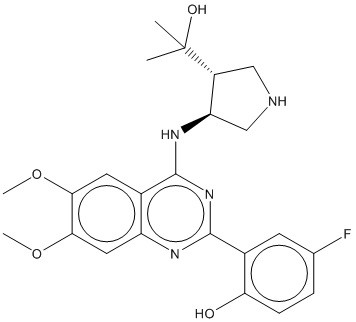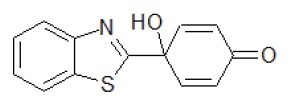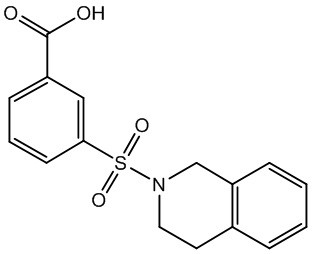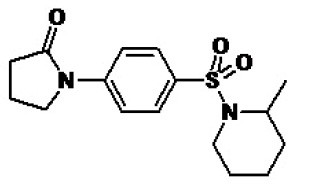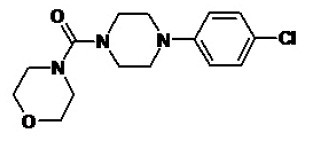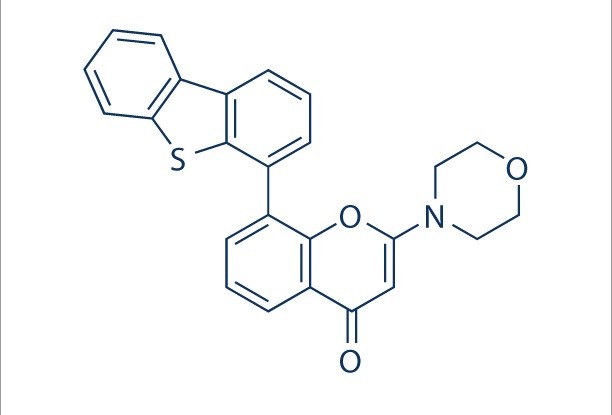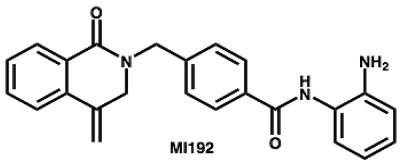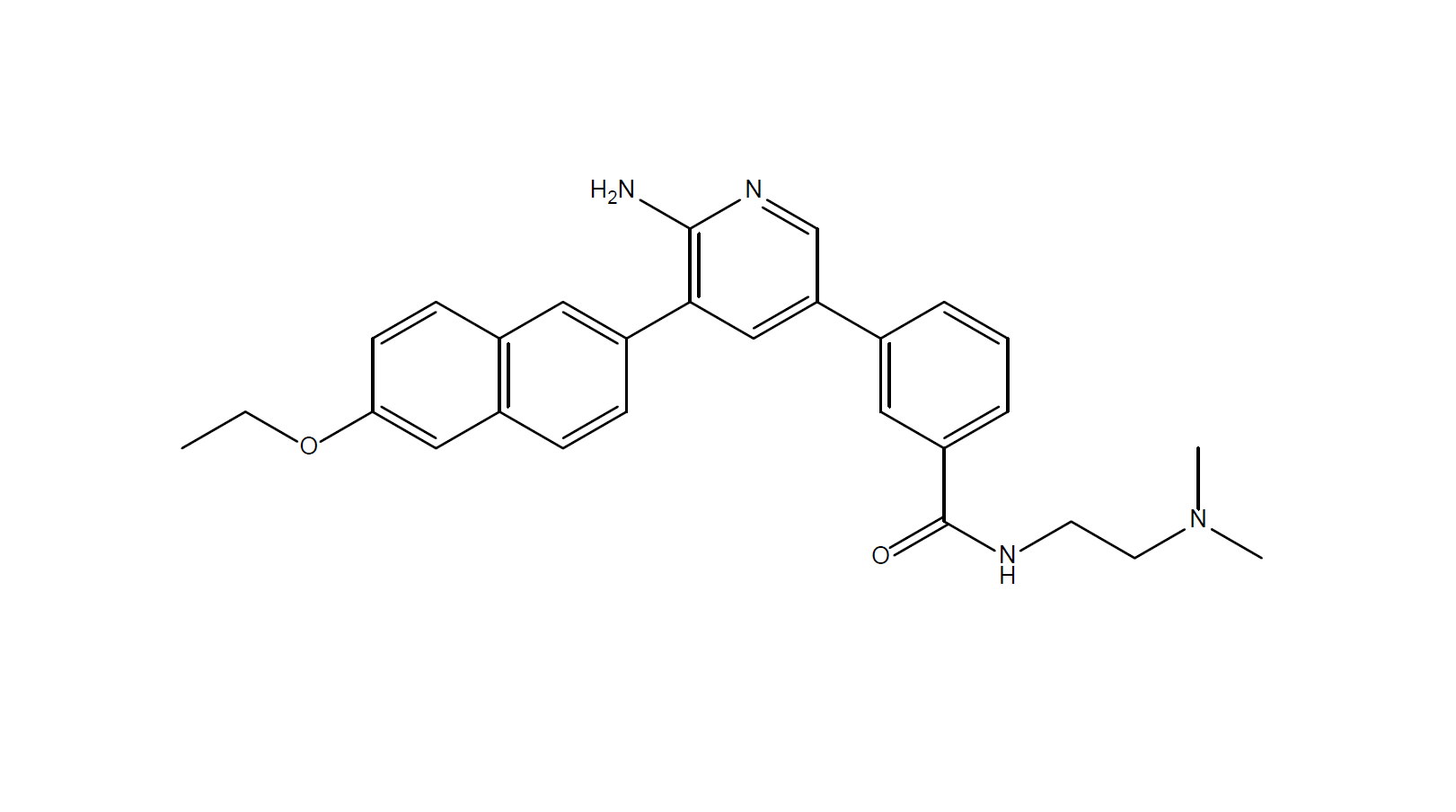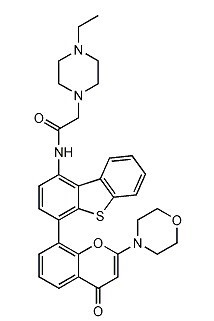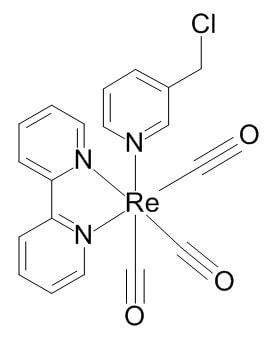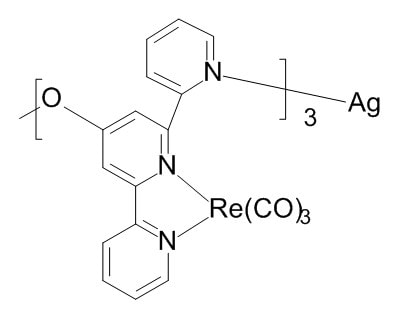Small molecules
Showing 76–100 of 260 results
Category
Research area
Cancer type
Inventor
Institute
Availability
Reset filters
-

Carbazole derivative HV-118
Carbazole derivative HV-118Cat. #161688
Application: Cancer research, anti-metastatic therapeutics development, potential treatment for other hyperproliferative diseases associated with Rac1 and Cdc42
-

EHop-016 Rac1 Inhibitor
EHop-016 Rac1 InhibitorCat. #161689
Application: Further development as a pharacological inhibitor of Rac activity in metastatic cancer cells
-

Myxoxanthophyll
MyxoxanthophyllCat. #161806
Sub-type: Carotenoid-glycoside
Application: Potential use in the cosmetic industry
-
MGMT inhibitor Lomeguatrib Small Molecule (Tool Compound)
MGMT inhibitor Lomeguatrib Small Molecule (Tool Compound)Cat. #151711
Sub-type: Inhibitor
Application: Lomeguatrib (20 mg/kg/day for 5 days) combined with Temozolomide (100 mg/kg/day for 5 days) produces a substantial tumour growth delay: median tumour quintupling time is increased by 22 days without any significant increase in toxicity, while neither of the two drugs administrated along show any antitumor activity. Lomeguatrib inactivates ATase and enhances the anti-tumour effect of Temozolomide in A375M human melanoma xenografts model. Lomeguatrib, at a single dose of 20 mg/kg i.p., produces...
-
CDK7 inhibitor BS-181 Small Molecule (Tool Compound)
CDK7 inhibitor BS-181 Small Molecule (Tool Compound)Cat. #151712
Sub-type: Inhibitor
Application: BS-181 is stable in vivo with a plasma elimination half-life in mice of 405 minutes after i.p. administration of 10 mg/kg. BS-181 inhibits the growth of MCF-7 xenografts in the nude mice model in a dose-dependent manner, with 25% and 50% reduction in tumor growth after 2 weeks of treatment at 10 mg/kg/day and 20 mg/kg/day, respectively without apparent toxicity. BS-181 is a small molecule inhibitor of CDK7 in a cell-free environment, which displays more potential activity than roscovitine with IC 50 of 510 nM. Among the CDKs and other 69 kinases from many different classes, BS-181 shows high inhibitory selectivity for CDK7, inhibits CDK2 at concentrations lower than 1 ÎźM which being inhibited 35-fold less potently (IC50 with 880 nM) than CDK7, shows slight inhibition for CDK1, CDK4, CDK5, CDK6 and CDK9 with IC50 values higher than 3.0 ÎźM, and only shows inhibition for several kinases from other classes at high concentrations (>10 ÎźM). BS-181 promotes cell cycle arrest and inhibits the cancer cell growth of a range of tumor types, including breast, lung, prostate and colorectal cancer with IC50 in the range of 11.5-37 ÎźM. In MCF-7 cells, BS-181 inhibits the phosphorylation of the CDK7 substrate RNA polymerase II COOH-terminal domain (CTD), and promotes cell cycle arrest and apoptosis to inhibit the growth of cancer cell lines.
-
Protein Kinase D inhibitor CRT0066101 Small Molecule (Tool Compound)
Protein Kinase D inhibitor CRT0066101 Small Molecule (Tool Compound)Cat. #151831
Sub-type: Inhibitor
Application: In Panc-1 subcutaneous xenograft model, orally administration of CRT0066101 at the dosage of 80 mg/kg/d for 24 days significantly suppressed pancreatic cancer growth. Moreover, when CRT0066101 reached its peak concentration (12 Îźmol/L) in tumor model, the expression of activated PKD1/2 in the treated tumor explants was substantially decreased. It was concluded that CRT0066101 given orally at 80 mg/kg/d for 21 days in Panc-1 orthotropic model suppressed tumor growth potently in vivo. Clinical...
-
LIMK inhibitor CRT0105950 Small Molecule (Tool Compound)
LIMK inhibitor CRT0105950 Small Molecule (Tool Compound)Cat. #151832
Sub-type: Inhibitor
Application: The compounds exhibit low uM potency in breast cancer cells showing dose dependent inhibition of phosphorylation of the LIMK substrate cofilin. Treatment of MDA-MB-231 breast cancer cells with the compounds significantly reduces their ability to invade a matrigel plug in an inverse in vitro invasion assay. Furthermore, the inhibitors effectively reduce fibroblast-led collective invasion in a co-culture organotypic model.
-
Chk2 inhibitor CCT241533 Small Molecule (Tool Compound)
Chk2 inhibitor CCT241533 Small Molecule (Tool Compound)Cat. #151833
Sub-type: Inhibitor
Application: CCT241533 blocked CHK2 activity in human tumor cell lines in response to DNA damage, as shown by inhibition of CHK2 autophosphorylation at S516, band shift mobility changes, and HDMX degradation. CCT241533 did not potentiate the cytotoxicity of a selection of genotoxic agents in several cell lines. However, this compound significantly potentiates the cytotoxicity of two structurally distinct PARP inhibitors. Clear induction of the pS516 CHK2 signal was seen with a PARP inhibitor alone, and th...
-
Antitumoral Quinol1h Small Molecule (Tool Compound)
Antitumoral Quinol1h Small Molecule (Tool Compound)Cat. #151834
Sub-type: Antitumoral
Application: Antitumor activity observed in HCT 116 (GI50 = 40 nM) and HT 29 (GI50 = 380 nM), and in breast cancer cell lines. Potent inhibitory effect in NCI 60 cells (GI50 =16 nM and LC50 = 2.24 ÂľM).
-
Antitumoral Phortress Small Molecule (Tool Compound)
Antitumoral Phortress Small Molecule (Tool Compound)Cat. #151839
Sub-type: Antitumoral
Application: Active against breast, ovarian and renal carcinomas. Taken up into sensitive cells followed by aryl hydrocarbon receptor binding and translocation into the nucleus. Requires metabolic activation by cytochrome P450 to generate cytotoxic species. Induces expression of CYP1A1 and generates adducts in the DNA of sensitive MCF7 and IGROV-1 cells.
-
Antitumoral Quinol2 Small Molecule (Tool Compound)
Antitumoral Quinol2 Small Molecule (Tool Compound)Cat. #151840
Sub-type: Inhibitor
Application: Displays in vivo antitumor activity against human RXF 944XL renal xenografts in nude NMRI mice. Inhibits thioredoxin reductase with potencies correlated with their antiproliferative and cytotoxic efficacies. Potent activity against renal, colon, and breast cancer cell lines in the NCI 60-cell panel. Shows potent antitumor activity in HCT 116 and HT 29 human colon as well as MCF 7 and MDA 468 human breast cancer cell lines.
-
AKR1C3 inhibitor CRT0036521 Small Molecule (Tool Compound)
AKR1C3 inhibitor CRT0036521 Small Molecule (Tool Compound)Cat. #151843
Sub-type: Inhibitor
Application: The compounds showed good cellular potency, as measured by inhibition of AKR1C3 metabolism of a known dinitrobenzamide substrate, with a broad rank order between enzymic and cellular activity, but amide analogues were more effective than predicted by the cellular assay. displays potency in a cellular assay, blocking the ability of AKR1C3 to metabolize a proven substrate.
-
DNA-PK inhibitor NU7441 Small Molecule (Tool Compound)
DNA-PK inhibitor NU7441 Small Molecule (Tool Compound)Cat. #151889
Sub-type: Inhibitor
Application: NU7441 intraperitoneally administrated at dose of 10 mg/kg maintains for at least 4 hours shows nontoxic and increases etoposide-induced tumor growth delay 2-fold in mice bearing SW620 xenografts. NU7441 increases the persistence of ÎłH2AX foci after ionizing radiationâinduced or etoposide-induced DNA damage. NU7441 (0.5 ÎźM or 1 ÎźM) appreciably increases G2-M accumulation induced by ionizing radiation, etoposide, and doxorubicin in both SW620 and LoVo cells. NU7441 causes persistence of d...
-
HDAC2/3 inhibitor MI-192 Small Molecule (Tool Compound)
HDAC2/3 inhibitor MI-192 Small Molecule (Tool Compound)Cat. #152433
Sub-type: Inhibitor
Application: Promotes apoptosis of leukemia cell lines in vitro. Also attenuates IL-6 production in rheumatoid arthritis PBMCs in vitro. MI-192 (CRT0163458) shows potent activity in a number of cell lines tested using the NCI-60 cell panel. MI-192 was tested using the following NCI-60 cell lines: Leukemia cell lines: CCRF-CEM, HL-60 (TB), K-562, MOLT-4 and RPMI-8226. Colon Cancer cell lines: COLO205, HCC-2998, HCT-116, HCT-15, HT29, KM12 and SW-620. CNS Cancer cell lines: SF-268, SF-295, SF-539, SNB-19, ...
-
Protein Kinase D inhibitor CRT5 (CRT0066051) Small Molecule (Tool Compound)
Protein Kinase D inhibitor CRT5 (CRT0066051) Small Molecule (Tool Compound)Cat. #152544
Sub-type: Inhibitor
Application: PLEASE NOTE THAT THIS COMPOUND IS TOXIC IN VIVO. CRT5 blocks phosphorylation of PKD1 on Ser916 and PKD2 on Ser876, but does not affect PKC-dependent PKD phosphorylation or PKD autophosphorylation.1 It also decreases VEGF-induced endothelial migration, proliferation, and tubulogenesis.
-
Mps1 inhibitor CCT251455 Small Molecule (Tool Compound)
Mps1 inhibitor CCT251455 Small Molecule (Tool Compound)Cat. #152625
Sub-type: Inhibitor
Application: CCT251455 displays a favorable oral pharmacokinetic profile, shows dose-dependent inhibition of MPS1 in an HCT116 human tumor xenograft model, and is an attractive tool compound to elucidate further the therapeutic potential of MPS1 inhibition. In Female Balb/C mice it had an oral bioavailabilty of 83%.
-
Dual DNA-PK/PI3K inhibitor KU-0060648 Small Molecule (Tool Compound)
Dual DNA-PK/PI3K inhibitor KU-0060648 Small Molecule (Tool Compound)Cat. #152709
Sub-type: Inhibitor
Application: KU-0060648 enhances the anti-tumour activity of etoposide in both MCF7 and SW620 xenograft models, and has single-agent activity in the MCF7 xenograft model. KU-0060648 exhibits differential effects on growth inhibition, but is not profoundly cytotoxic in a panel of human cancer cell lines. It inhibits DNA-PK and PI-3K with greater potency in MCF7 than SW620 cell using cell-based assays. Five-day exposure to 1 mM KU-0060648 inhibits cell proliferation by more than 95% in MCF7 cells but only b...
-

CDK2 inhibitor NU6301 Small Molecule (Tool Compound)
CDK2 inhibitor NU6301 Small Molecule (Tool Compound)Cat. #152754
Sub-type: Inhibitor
Application: The prodrug NU6301 rapidly generated NU6102 in vitro in mouse plasma, and tumour NU6102 levels in vivo consistent with activity in vitro. Eight or 12 hourly dosing of 120 mg/kg NU6301 for 10 days was well tolerated in SKUT-1B tumour-bearing mice and inhibited Rb phosphorylation in tumour tissue. Two (8 hourly dosing) and 3 (12 hourly dosing) day tumour growth delay was observed (p=0.04 and p=0.007, respectively) following NU6301 administration. NU6102 selectively inhibited the growth of CDK2 WT (wild type) versus KO MEFs (knockout mouse embryo fibroblasts) (GIâ â (concentration required to inhibit cell growth by 50%) 14 ÎźM versus >30 ÎźM), and was more growth-inhibitory in p53 mutant or null versus p53 WT cells (p=0.02), and in Rb (retinoblastoma protein) WT SKUT-1B versus SKUT 1 Rb deficient cells (p=0.01). In SKUT-1B cells NU6102 induced a G2 arrest, inhibition of Rb phosphorylation and cytotoxicity (LCâ â 2.6 ÎźM for a 24h exposure).
-
Mitochondrial Luminophore Small Molecule (Tool Compound)
Mitochondrial Luminophore Small Molecule (Tool Compound)Cat. #152785
Sub-type: Luminophore
-
Nucleolar Luminophore Ag-1 Small Molecule (Tool Compound)
Nucleolar Luminophore Ag-1 Small Molecule (Tool Compound)Cat. #152786
Sub-type: Luminophore

